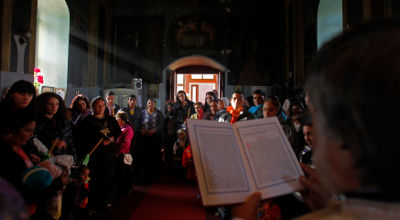Persecution on the Rise for Christians in Eastern Europe
It’s been a long road since the revolution that swept away atheistic communism in Eastern Europe 20 years ago. The wave of religious freedom that swept the region now seems to be receding.
Citizens of the former Soviet Union are facing growing restrictions on their religious freedom. On Wednesday a panel of experts in Washington reported that governments are closing more churches, fining and arresting their religious leaders, and destroying church literature.
“Twenty years ago when the Soviet Union fell apart, collapsed, when the Berlin Wall fell, everybody was sort of excited about all the future possibilities. Twenty years later we are again talking about freedom. What happened?” Victor Ham, vice president for the Billy Graham Evangelical Association Crusades, said.
The situation might not be a return to the Soviet era, but the signs spell trouble.
“Churches are being torched, crosses are being burned. There’s a lot of anti-Semitism, a lot of negative things appearing in the press about different organizations. So there’s some reason for concern,” Lauren Homer, with Homer International Law Group, said.
The atmosphere is thick with intolerance in these countries. Individual pastors are reluctant to speak out against abuses and restrictions.
“He’s not so interested in going to the government and speaking to the ministers and so on because really it is a question of security most of all,” Matti Sirvio, with Greater Grace Protestant Church, said. “Will it be used against them? Will their persecution become even worse.”
In Uzbekistan, Sirvio encouraged church members to connect to the outside world as their best defense.
“I think people should all learn how to use the Internet, they should all learn the English language,” he said. “And these two things will connect them in the future with the rest of the world and especially with the Body of Christ around the world.”
Russian Ministries hopes that by shining a spotlight on these issues, international politicians and human rights proponents will do more to defend religious minorities in the former Soviet Union.














































